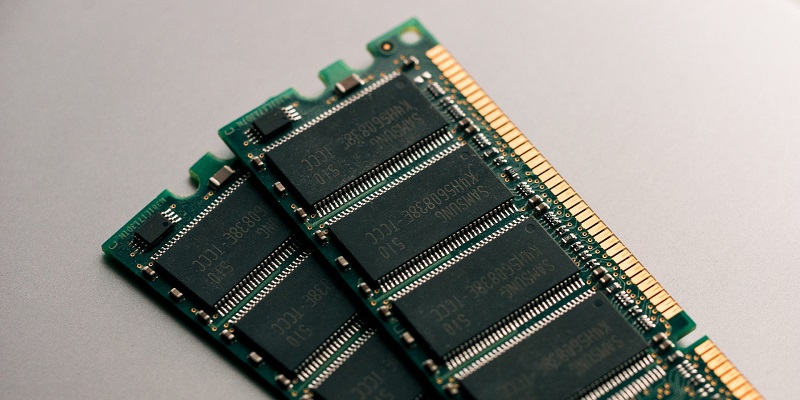In a world where technological advancements demand smaller, faster, and more efficient components, Samsung has emerged as a front-runner with its latest innovation – the low-power compression attached memory module (LPCAMM). This groundbreaking notebook computer memory promises to revolutionize the way we perceive and utilize memory modules. Let’s delve into the details and explore the potential of this new innovation.
Comparison with traditional memory modules
When it comes to size, efficiency, and ease of use, LPCAMM outshines its traditional counterparts. These cutting-edge modules are not only smaller and more compact but also incredibly efficient, enabling users to easily swap them out as needed. This marks a significant departure from conventional memory modules, which often pose challenges in terms of size and accessibility. LPCAMM eliminates these obstacles, providing users with a seamless memory upgrade experience.
Compact design and space-saving benefits
One of the standout features of LPCAMM is its compact design, which occupies only 40% of the space occupied by traditional SO-DIMMs on the motherboard. This breakthrough in space-saving allows for more streamlined and efficient laptop and desktop designs. With laptops becoming increasingly thin and lightweight, every square inch counts. LPCAMM’s efficiency in terms of space utilization makes it a game-changer for space-constrained laptops and congested desktop motherboards.
Enhanced performance and power efficiency
The LPCAMM memory module offers up to 50% better performance compared to traditional memory modules. This boost in performance not only enhances the overall user experience but also enables more seamless multitasking and resource-intensive operations. Moreover, LPCAMM significantly improves power efficiency, reducing power consumption by up to 70%. This translates to longer battery life, reduced heat generation, and ultimately, a greener and more sustainable computing experience.
Unmatched data rates
Samsung sets a new benchmark in memory speed with LPCAMM, achieving data rates of up to 7,500 MT/s. This remarkable milestone surpasses the capabilities of SO-DIMM memory modules by approximately 15%. The improved data rates offer faster data processing, facilitating quicker application loading times, smoother multitasking, and enhanced overall system responsiveness. This breakthrough will undoubtedly unlock new possibilities for users across various computing applications.
Increased capacity and removability
LPCAMM raises the bar in terms of memory capacity, providing higher maximum capacity options compared to LPDDR memory. This expanded capacity is particularly advantageous for users who demand extensive storage capabilities for their data-intensive tasks, such as content creation, video editing, and gaming. Furthermore, unlike LPDDR memory modules that are soldered onto the motherboard, LPCAMM is designed to be removable. This feature grants users the flexibility to upgrade or replace memory modules without the need for intricate soldering processes.
Applications on space-constrained laptops and congested desktop motherboards
LPCAMM’s compact size and exceptional performance make it an ideal choice for space-constrained laptops. As laptops continue to become thinner, manufacturers face increasing challenges in accommodating memory modules without compromising other essential components. The reduced footprint of LPCAMM paves the way for slimmer and lighter laptops, enabling manufacturers to prioritize design aesthetics and portability without sacrificing performance.
Similarly, congested desktop motherboards can benefit from LPCAMM’s smaller form factor. With densely populated motherboards often restricting airflow and causing temperature-related issues, LPCAMM’s compact design not only optimizes space utilization but also contributes to improved thermal management. This, in turn, leads to enhanced system stability and longevity.
Boosting speed and maintenance in data centers
Data centers are the backbone of our digital infrastructure, handling vast amounts of information and performing resource-intensive operations. LPCAMM has the potential to revolutionize data center memory systems, providing faster speeds and easier maintenance. The high-speed data rates and increased performance offered by LPCAMM can significantly enhance data processing capabilities, allowing data centers to handle complex tasks with greater efficiency. Additionally, the detachable nature of LPCAMM ensures easier maintenance and upgrades, minimizing downtime and maximizing productivity in critical data center environments.
Collaboration with Intel Platform and Future Availability
Samsung has been engaged in extensive testing and development of LPCAMM in collaboration with an unnamed Intel platform. This strategic partnership assures users of the robustness, compatibility, and reliability of LPCAMM with Intel-based systems. The collaboration underscores both companies’ commitment to delivering cutting-edge technology that meets the evolving demands of the market.
The first boards featuring LPCAMM are expected to hit the market in 2024, initially supporting Intel platforms. This phased rollout ensures a seamless integration process while allowing users to experience the benefits of LPCAMM on widely adopted platforms. As demand grows and market adoption expands, we can anticipate wider availability across various computing environments, bringing the advantages of LPCAMM to an increasingly diverse range of users.
Samsung’s LPDDR4X memory modules represent a significant leap forward in notebook computer memory technology. With their compact design, improved performance, power efficiency, versatility, and collaboration with industry giants like Intel, LPDDR4X holds immense promise for the future of memory modules. Whether it’s space-constrained laptops, congested desktop motherboards, or data-intensive data center operations, LPDDR4X is poised to elevate user experiences and redefine the boundaries of computing performance.

